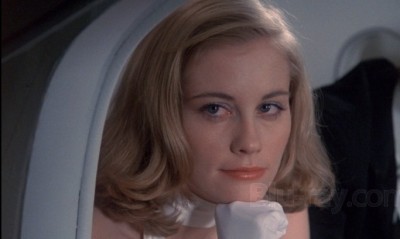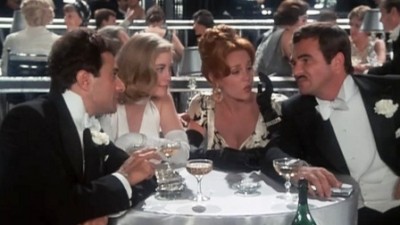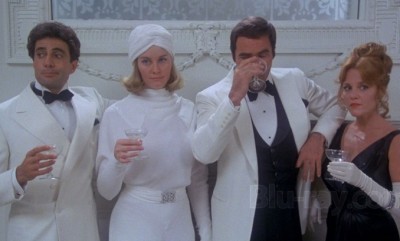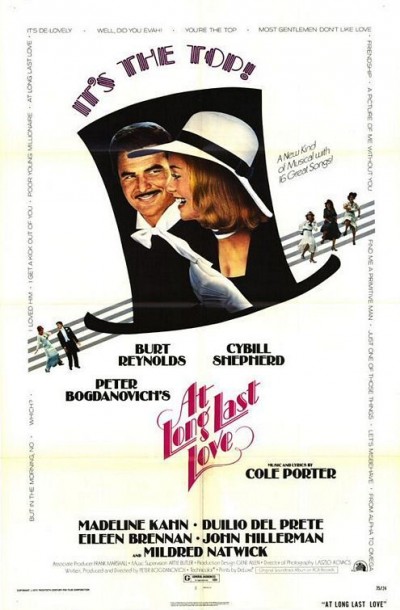
I should confess that I have always liked Peter Bogdanovich’s At Long Last Love — and count myself lucky to have seen it on its opening weekend before the studio started hacking it apart in an attempt to make audiences like it better (or at least dislike it less). I saw it that first weekend by a quirk of fate — namely because Ken Russell’s Tommy was sold out and had a line around the theater for the next show. Oh, I knew what the Bogdanovich film was (I don’t think the bulk of the audience did) and had planned on seeing it because I’d liked most of his other films, but it only inadvertently made it to the top of my list. The movie was — and is — a specialized concoction. Bogdanovich had made a 1930s styled musical 40 years out of its time.
It was essentialy an experiment in “pure musical” form being presented as mainstream entertainment. And however successful it was as an experiment it, at best, puzzled audiences. Worse, the critics didn’t get it — or didn’t want to get it for a variety of reasons. At Long Last Love was Bogdanovich’s take on an Ernst Lubitsch musical comedy — the style is pure Lubitsch — but it was also an extension of that kind of musical. Instead of the usual five or six songs found in a 1930s musical, Bogdanovich’s film was packed with Cole Porter tunes. The poster claims 16 songs. I count 18. (The TV print added another, “Etiquette,” which is in no other version.) The result was a movie where people sang more than they spoke. The songs not only drove the plot, but Bogdanovich had written the film to include them. In short, the story was built from the songs. Think of Julie Taymor’s Across the Universe (2007), only with Cole Porter songs instead of The Beatles.

The critics, at least some of them, might have “gotten” what Bogdanovich was attempting, but there were other factors at work. Bogdanovich had been both a critical and commercial success up until his last film, Daisy Miller (1974), which had started souring the critics on him — not in the least because he cast his then-girlfriend, Cybill Shepherd, in the title role. In their opinion, he was trying to shove her down our throats in this. Worse, he was trying to palm her off as a musical star. The axes were poised to fall before the film started to unroll. And fall they did. Everyone’s singing was attacked except Madeline Kahn’s. No one paused to realize that the actors were perfectly up to the chore if you took them as singing in character. None of them were destined for record contracts, but within context they weren’t bad. But the critics weren’t having it, the audience wasn’t having it — and not too long afterward the film found itself in books on “bad” movies (by people who shouldn’t be writing).

Looked at today, without the baggage of 1975, At Long Last Love is much more artistically successful than is generally allowed. The opening — with each of the main characters introduced by a song over the course of an evening into the early morning — is brilliant. The choice of recording the musical numbers live on the set (no, Les Miserables didn’t come up with that last year) may have tested the cast’s vocal skills, but it paid dividends in some beautifully choreographed long takes. The scenes in which each of them sings the title song is remarkable, especially the parts with Madeline Kahn and Duilio Del Prete. There’s a relaxed magic and heart to it that is hard to describe, while the follow-ups by Reynolds (echoing Charlie Ruggles reprising “Mimi” while shaving in Rouben Mamoulian’s Love Me Tonight (1932)) and Shepherd are pleasantly comedic. The film is full of such moments.

True, there are occasional lapses. The party scene with “Well Did You, Evah?” is sometimes awkwardly staged (the logistics with live sound must have been horrific), but it rights itself at the end, becoming truly touching when Dep Prete and Kahn realize that they’ve been thrown over by Shepherd and Reynolds respectively. Some of the subsequent scenes with Shepherd and Reynolds outstay their welcome. (It was in this stretch that a large chunk of the audience I saw the film with in 1975 headed for the exit.) But the film’s final section is a tour de force of filmmaking — including a dialogue and song-free gag in a theater lobby that would have charmed Lubitsch — that leads to one of the most haunting endings I’ve ever seen in a musical. I think it’s time this “disaster” had a complete re-evaluation. There is so much here to admire and enjoy. Plus, when you set the musical aspect to one side, you might be surprised to find that it also has a very witty screenplay. Give it a shot.




I feel the sudden urge to sing…
Are you screening the theatrical cut or the more recent re-edit of the film?
Well, the only good copy there is is the supposed re-edit — and you know I’m damned if it looks any different to me than the theatrical print.
Bogdanovich thinks it’s a substantial improvement from his original cut. There’s some convoluted history to it coming to light and being released that he went into in a recent KCRW interview.
I could compare it to the cut that Fox Movie Channel used to run, but it looks at least close to identical to me. I was hoping “Etiquette” was back in, but that seems to have only ever ended up in an old TV print (pre-FMC). If I have the time, I might compare them tomorrow.
You guys should play They All Laughed. There is an interesting interview that Wes Anderson did with Peter Bogdanovich on Youtube about the film.
http://www.youtube.com/watch?v=MQPzzNhqGCo&feature=share&list=PL953D744B42E05269
I’m looking forward to the Wes Anderson, Noah Baumbach, Peter Bogdanovich collaboration Squirrels to the Nuts in 2014.
That’s a very interesting interview. Thanks for pointing it out.
Have you seen both movies?
No ive only seen Targets, Last Picture Show, and Paper Moon.
I could compare it to the cut that Fox Movie Channel used to run, but it looks at least close to identical to me. I was hoping “Etiquette” was back in, but that seems to have only ever ended up in an old TV print (pre-FMC). If I have the time, I might compare them tomorrow.
Well, I can’t find the old FMC print, but I did watch the “new” version again. The only thing I saw that I thought might be different is the reprise of “From Alpha to Omega.” Everything else I know I’ve seen before. The individual numbers would be almost impossible to do anything to because they’re in such long takes.